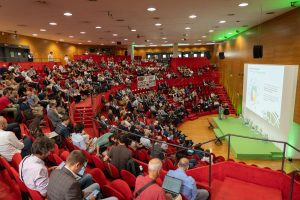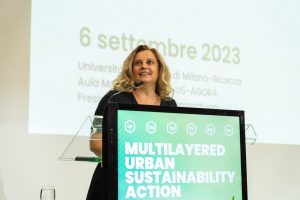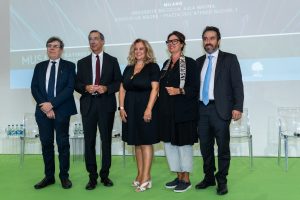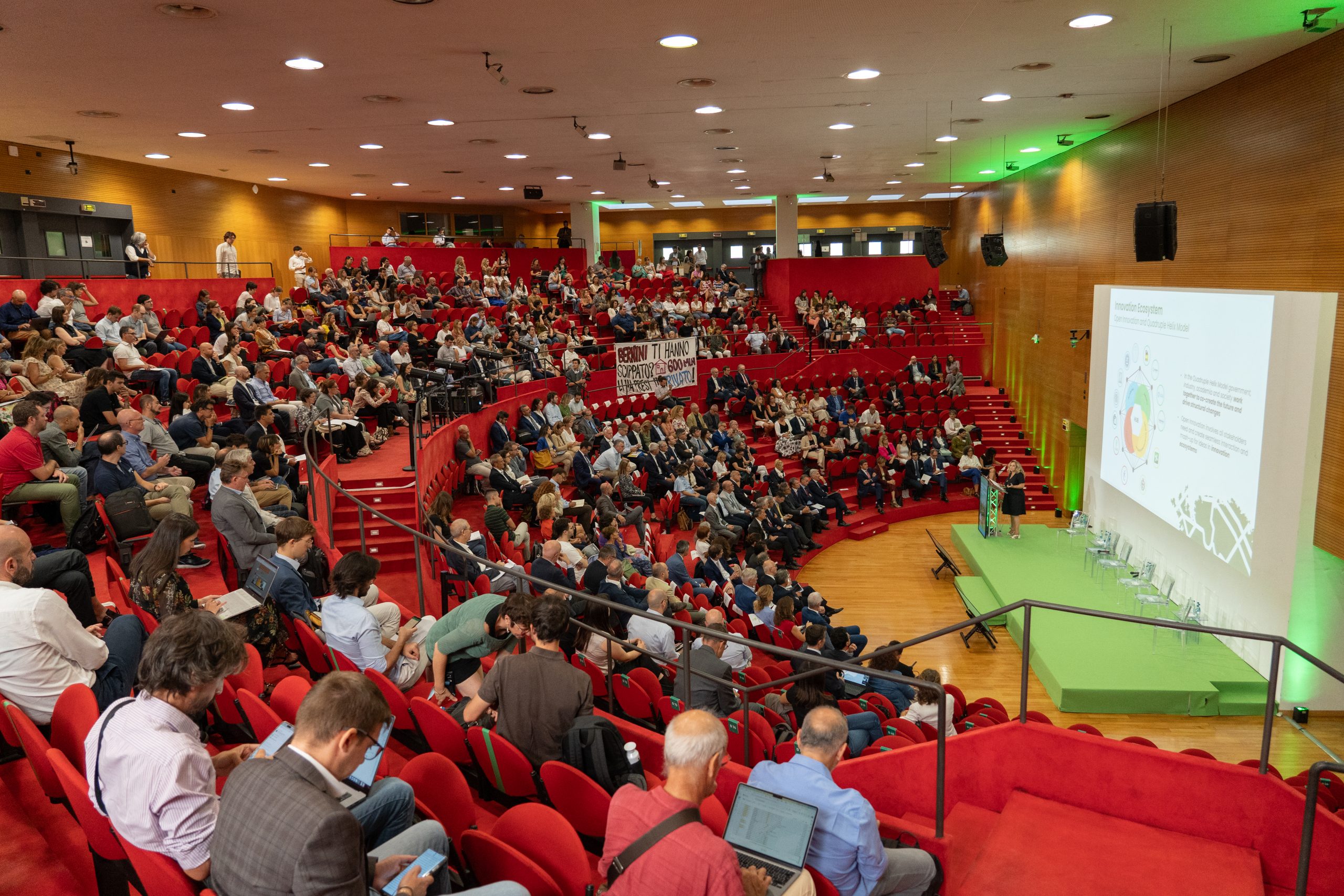President Iannantuoni: “An Innovative Ecosystem for the Territory, Social Fabric, and Economy
 From research laboratories to the metropolis: there are over 100 ongoing projects for the future of Milano thanks to MUSA, Multilayered Urban Sustainability Action, a project funded with PNRR funds. A thousand researchers for a hundred scientific activities dedicated to the environment, digital, and inclusion, 194 new hires (55 percent women, with an average age of 32), 26 public and private entities involved, and a total investment of 116 million euros. This is the result of the first year since the launch of the project, born from the collaboration between the University of Milano-Bicocca – the promoting entity – the Polytechnic University, Bocconi University, and the University of Milano, and funded by the Ministry of University and Research.
From research laboratories to the metropolis: there are over 100 ongoing projects for the future of Milano thanks to MUSA, Multilayered Urban Sustainability Action, a project funded with PNRR funds. A thousand researchers for a hundred scientific activities dedicated to the environment, digital, and inclusion, 194 new hires (55 percent women, with an average age of 32), 26 public and private entities involved, and a total investment of 116 million euros. This is the result of the first year since the launch of the project, born from the collaboration between the University of Milano-Bicocca – the promoting entity – the Polytechnic University, Bocconi University, and the University of Milano, and funded by the Ministry of University and Research.
Numbers, projects, and faces were presented on September 6th in the Aula Magna of Bicocca, in the presence of the president of MUSA and rector of the University Giovanna Iannantuoni, the mayor of Milano, Giuseppe Sala, the Councillor for Innovation and Sustainability Policies in the university and research field, also in the implementation of the PNRR of the Ministry of the Interior, Alessandra Gallone. Also present were the Rector of Bocconi University, Francesco Billari, the Rector’s Delegate for Technology Transfer of the Polytechnic University of Milano, Marco Bocciolone, the Rector of the University of Milano, Elio Franzini, the President of CRUI, Salvatore Cuzzocrea, the President of Assolombarda, Alessandro Spada, the President of the Global Compact Italy Foundation, Marco Frey, and the consultant to the Ministry of University for the PNRR and professor of Financial Systems Analysis and Public Management at the University of Bergamo, Stefano Paleari, coordinated by the deputy director of Corriere della Sera, Venanzio Postiglione.
 MUSA includes among its many research lines an algorithm to identify hidden water tables in Milano, an artificial intelligence-based software for monitoring online hate speech, an intelligent system for managing telemedicine potential, and a project for using rainwater in agriculture and other fields. “An innovative ecosystem – highlighted Giovanna Iannantuoni, rector of Bicocca – for urban regeneration and sustainability dedicated to the Milano area that will create solutions that can also be used at the regional and national levels.” But also an “innovative model of collaboration between the public and private sectors, capable of creating value for the territory, the social fabric, and the economic fabric, as demonstrated by the 194 young researchers already hired and others who will be hired in the coming months. I am enthusiastic about the results of this first year of activity, and all the people of MUSA deserve my thanks for their commitment and passion.”
MUSA includes among its many research lines an algorithm to identify hidden water tables in Milano, an artificial intelligence-based software for monitoring online hate speech, an intelligent system for managing telemedicine potential, and a project for using rainwater in agriculture and other fields. “An innovative ecosystem – highlighted Giovanna Iannantuoni, rector of Bicocca – for urban regeneration and sustainability dedicated to the Milano area that will create solutions that can also be used at the regional and national levels.” But also an “innovative model of collaboration between the public and private sectors, capable of creating value for the territory, the social fabric, and the economic fabric, as demonstrated by the 194 young researchers already hired and others who will be hired in the coming months. I am enthusiastic about the results of this first year of activity, and all the people of MUSA deserve my thanks for their commitment and passion.”
In the field of urban regeneration, work is being done on the exploitation of geothermal energy from the subsoil and photovoltaic energy to make Milano-Bicocca a zero-emission campus. The energy transition project of the university, replicable in other areas of the city, also started on June 12th. Bocconi University is responsible for evaluating the economic, social, and environmental impact of these new high-tech systems. Among the projects for digitization, the use of 5G technologies and artificial intelligence will optimize the capacity to work on big data to support, digitize, and implement a series of services useful to citizens, such as telemedicine and remote monitoring for vulnerable people. The University of Milano will coordinate the project.
 In the field of technological entrepreneurship, the synergy between the academic and entrepreneurial worlds is fundamental. Seventeen technology scouting activities have been launched, involving the Polytechnic University of Milano and other universities. The StartCup Lombardia project, promoted by the Lombardia Region and organized by the four universities of MUSA, aims to support technological innovation and promote the birth and development of new high-potential businesses. On November 30th and December 1st, 2023, with the support of the Lombardia Region and in collaboration with the PNI Cube association, MUSA will host in Milano the Premio Nazionale per l’Innovazione, the national competition that involves the winners of the regional challenges among start-ups. In the field of sustainable innovation, the involvement of the community in the projects is essential: the six Living Labs created by the Polytechnic University of Milano and the University of Milano, research laboratories that, through interaction with different categories of users, will improve the living conditions of the population and the quality of the environment.
In the field of technological entrepreneurship, the synergy between the academic and entrepreneurial worlds is fundamental. Seventeen technology scouting activities have been launched, involving the Polytechnic University of Milano and other universities. The StartCup Lombardia project, promoted by the Lombardia Region and organized by the four universities of MUSA, aims to support technological innovation and promote the birth and development of new high-potential businesses. On November 30th and December 1st, 2023, with the support of the Lombardia Region and in collaboration with the PNI Cube association, MUSA will host in Milano the Premio Nazionale per l’Innovazione, the national competition that involves the winners of the regional challenges among start-ups. In the field of sustainable innovation, the involvement of the community in the projects is essential: the six Living Labs created by the Polytechnic University of Milano and the University of Milano, research laboratories that, through interaction with different categories of users, will improve the living conditions of the population and the quality of the environment.
And again, in the field of social inclusion are the Digital Pacts projects aimed at minors, in collaboration with the Milan City Council, and B-Youth Forum, as part of the Generations Festival, a research workshop organised by the University of Milan Bicocca open to young people between 14 and 25 years of age on the themes of participation in public space. The flagship of this line of research is Human Hall, a real Rights Hub realised in collaboration with the business world, the third sector and local institutions. Under the guidance of the Milan State University, professors, researchers and doctoral students from different disciplinary fields have launched 18 projects dedicated to monitoring at-risk categories, from foreigners to women victims of violence. In the same sphere also an artificial intelligence-based software for monitoring online hate speech.
Representing the many researchers involved in the project were six symbolic faces who described the first year of MUSA in a clip. From Tamara Gaia Vasiljev, who specialises in statistical methodologies for the development of green and eco-sustainable cosmetic products, to Stefano Ronchi, who is devoting himself to the comparative analysis of welfare policies, social inequalities and the social dimension of the EU, to Chiara Serra, whose research focuses on understanding the origins of inequalities and social exclusion, studying marginality in its most serious forms, and analysing the determinants of physical and mental health. And again, Nicola Bena, who works in the field of security assurance, focusing on certification and risk management techniques for next-generation distributed systems, at the crossroads of cloud, edge, IoT and ML, Gabriele Stancato, engaged in the development and implementation of machine learning algorithms to study and anticipate the human-environment relationship, and Khatereh Ghasemzadeh, who is dedicated to investigating the various aspects of the Living Lab approach, also addressing the issues of sustainable mobility and renewable energy.
Enthusiastic about the initiatives and activities launched in this first year was the Mayor of Milan Giuseppe Sala, who described MUSA as ‘a valuable project, able to inspire and stimulate many researchers to find solutions to make our city and cities in general a more sustainable place to live economically, environmentally and socially. I am proud,’ he emphasised, ‘that the City Council is an active participant in this project, because by working together, with the institutions and with private partners, Bicocca University, the Politecnico, Bocconi University and the University of Milan are demonstrating that if forces, energies and minds are united, and if commitment and goals are shared, it can really have a positive, innovative and quality impact on the territory and on people’s daily lives.
In line with Sala was the Lombardy Region’s Councillor for Universities, Research and Innovation, Alessandro Fermi, who focused on the ‘great opportunities generated by the University-Research duo’. A project that MUSA, added Alessandra Gallone, advisor to the Minister for Universities and Research, which “looks far ahead and opens up new perspectives and new scenarios between environmental, economic and social value through laboratories, pilot plants and simulators”.
Finally, Alessandro Spada, President of Assolombarda, described MUSA as an ‘innovation accelerator located in the very area that generates the most at national level: here, in Milan and Lombardy, 20% of R&D expenditure is concentrated and 27% of innovative start-ups are based. Now we need to act,’ Spada concluded, ‘to bridge the gaps that exist in international comparison. We are increasingly strengthening collaboration between the world of research and the business system with the aim, among others, of fostering the development of skills consistent with those required by the labour market, a real emergency for companies’.





